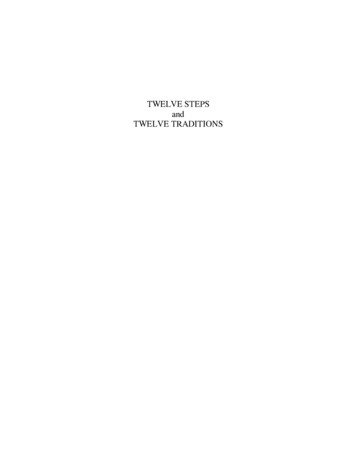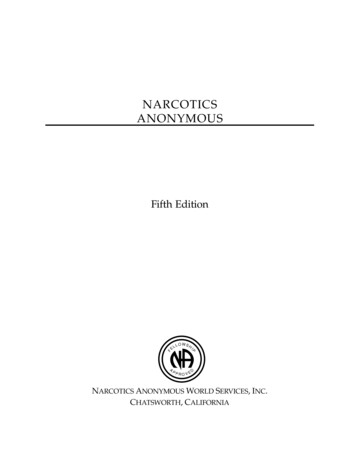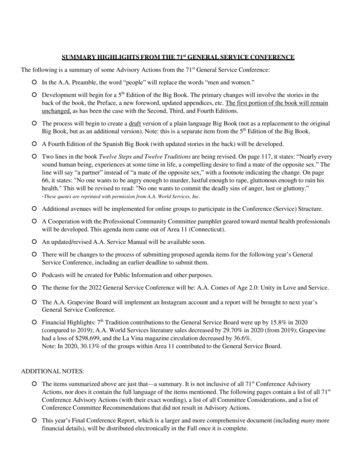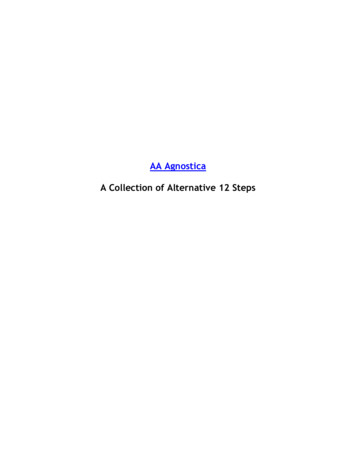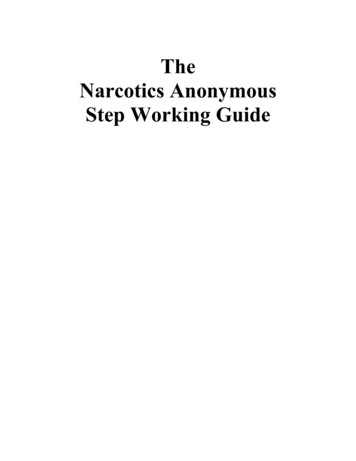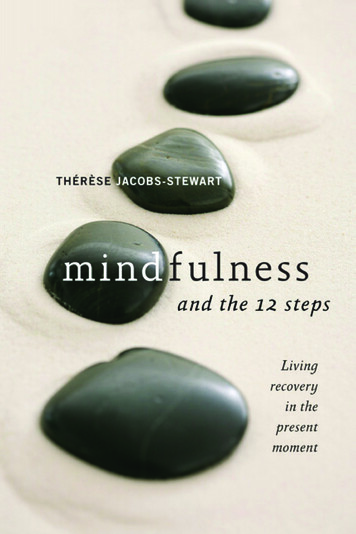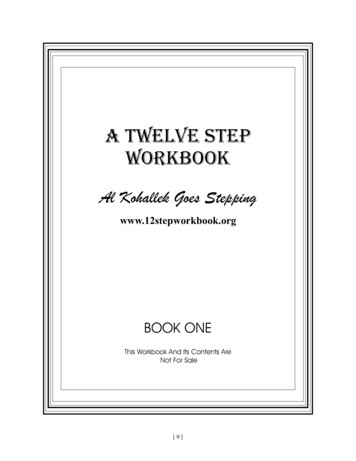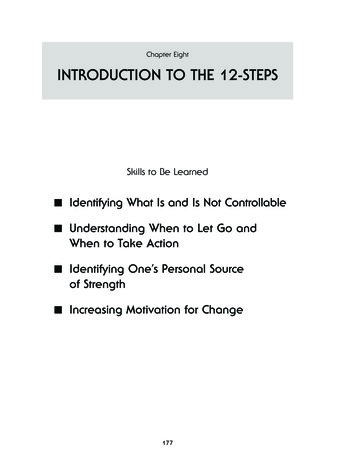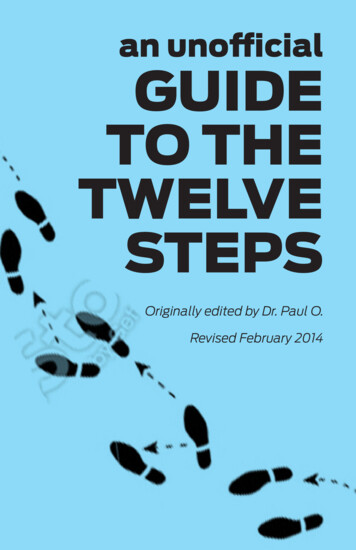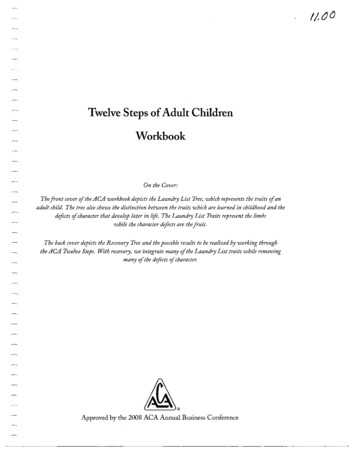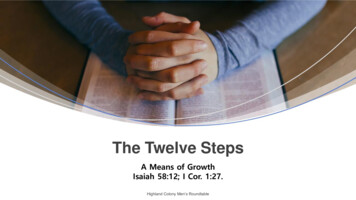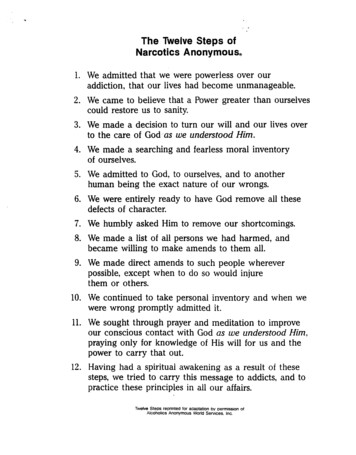
Transcription
The Twelve Steps ofNarcotics Anonymous@1. We admitted that we were powerless over ouraddiction, that our lives had become unmanageable.2. We came to believe that a Power greater than ourselvescould restore us to sanity.3. We made a decision to turn our will and our lives overto the care of God ·as we understood Him.4. We made a searching and fearless moral inventoryof ourselves.5. We admitted to God, to ourselves, and to anotherhuman being the exact nature of our wrongs.6. We were entirely ready to have God remove all thesedefects of character.7. We humbly asked Him to remove our shortcomings.8. We made a list of all persons we had harmed, andbecame willing to make amends to them all.9. We made direct amends to such people whereverpossible, except when to do so would injurethem or others.10. We continued to take personal inventory and when wewere wrong promptly admitted it.11. We sought through prayer and meditation to improveour conscious contact with God as we understood Him,praying only for knowledge of His will for us and thepower to carry that out.12. Having had a spiritual awakening as a result of thesesteps, we tried to carry this message to addicts, and topractice these principles in all our affairs.Twelve Steps reprinted for adaotation by permission ofAlcoholics Anonymous World Services. Inc.
MEMORANDUMDATE:December 11, 1996TO:RLC's and ALC's and Conference ParticipantsFROM:Jorge Blanco, WSC Uterture ChairpersonRE:Review and Input for the Step Working Guides 1-4We are please to announce the review and input drafts of the Step Working Guides (Onethrough Four) are enclosed in this packet. This is a time many of us have been patientlywaiting for. This work has been dervied from initial input of more than 36 regions and areasover the last nine years. Here is some additional information about the format of this guide:there will be an introduction at the beginning of the guide which will discuss working with asponsor and that this is not the only way to work the steps. We realize that this guide will notrepresent all the diversity that exists within our fellowship but we hope that with yourparticipation it will have the flavor of Narcotics Anonymous. It is exciting to know that yourparticipation will help us complete the Step Working Guides to assist our members with theirmany journeys through the Twelve Steps. We have found that a conceptual review of thesteps is more useful than a line by line review. We have provided you with questions that theWSCLC used when going through the material. Here are some points that you may findhelpful in your review.Narrative: Review the narrative for description and "invitation" to the reader. Does the narrative adequately introduce the concept and prompt thought towards selfexamination?Concepts Do the drafts invite the reader to identify the concepts that are inherent in each step? Are these drafts missing any important concepts?Questions Do the questions complement the paragraph they follow? Do any of the questions need to be rewritten? Is the section missing any important questions?ClosingAfter reading the drafts, you might want to place yourself in the postion of a sponsor and ask"would I use these drafts with someone I sponsor?", or from the position of a sponsee "would Iknow what I was suppose to get from working each step?" You may find other items that willneed to be addressed please mark them clearly. We have enclosed a Review and InputForm to be used for all your suggestions and comments. Please feel free to make copies ofthis form or use this format when typing/writing your C9mments. We have included linenumbers only to assist you in your review please send conceptual review not a line by lineinput or a grammatical copy edit. Please note that the deadline for this input is February 1,1997. Thank you for your participation in advance and we are looking forward to your input.
Page4Step Working Guides ReportTimeline for Step Working GuidesPlease remember input that doesn't make it in by the deadline may or may not be considered orincluded in the process.September 6-8, 1996 Core Group MeetingDrafting of Steps 1-4Full Report to the FellowshipProject plan with timeline.October 18, 1996 Friday MailingMailing of completed first draft of Steps 1-4 to the whole WSCLC.November 15-17, 1996 WSCLC MeetingReview of Steps 1-4 by the whole WSCLCFine tune any decisions and any direction to core group and review processDecember 13, 1996 Friday Fellowship MailingMailing of review and input drafts of Steps 1-4 to the fellowship with cover letter andinstructions for review and input with February 1st deadline.January 17-19, 1997 Core Group MeetingDrafting Steps 5-8February 1, 1997 Fellowship Deadline for Review and InputDeadline review & input from fellowship on Steps 1-4February 21, 1997 WSCLC MailingMailing of fellowship review and input of Steps 1-4 and 1st draft of 5-8March 21-23, 1997 WSCLC MeetingFull WSCLC meeting working on first draft of Steps 5-8Factoring input on 2nd draft of Steps 1-4April 4, 1997 Fellowship MailingMailing of drafts 5-8 to the fellowship with cover letter for direction for review and inputwith June 1st deadlineMay '97 Core Group Meeting1st draft of Steps 9-12 and the IntroductionJune 1, 1997 Deadline Fellowship Review and InputFellowship review and input on Steps 5-8June 17, 1997 WSCLC MailingMaster packet of review and input for Steps 5-8
Step Working Guides ReportPagesTimeline for Step Working Guides (continued)July '97 WSCLC MeetingFull WSCLC meeting Steps 9-12 1st draft and,working on a 2nd draft of Steps 5-8Finalizing Steps 1-4August 1, 1997 Mailing to FellowshipReview and input of Steps 9-12 and the Introduction with cover letter and instructionsSeptember 15, 1997 Deadline Fellowship Review and InputFellowship review and input of Steps 9-12September 27, 1995 WSCLC MailingMaster packet of review and input for Steps 9-12October '97 WSCLC MeetingFull WSCLC meeting finalize Steps 5-8 and 9-12Approval of final formDecember 1,1997 CARFinal approval form completed for inclusion in CAR '97WSC '98 Conference Approved!!q:\lit\chair\swgreprt.doc
HELPFUL HINTS FOR LIT REVIEW MEETINGSSome suggestions might help: Set a shorter meeting time versus longer (3-4 hrs vs. 6-8 hrs) Folks will come tomeetings that don't unduly intrude on their personal time off. Have everything ready before hand-copies of material for all participants (paper.pencils, etc.) Before beginning, decide upon and explain your objectives for this specific meeting,for example to read the piece in mind aloud, discuss the questions ·to be asked.allow everyone to speak their perspective Choose meeting date and times with care. Folks prefer shorter focused meetingsversus free-form all day or night sessions. If in your local committee everyone goesskiing every Saturday morning, then you wouldn't want to schedule your meeting atthat time, so consider times more likely to attract participation. Don't rely on group or area announcements. Make up interestingly worded flyersand pass out. Use your imagination, for example, the theory of relativism as itapplies to NA, or I am an addict when I figure it out (IP review Am I An Addict?) orBronco Busting (IP review of Recovery & Relapse). Be prepared. Have the meeting place ready, all materials needed, and start and endon time. Shorter meetings (2-3 hrs vs. 4-6 hrs) are more likely to keep folks comingback. So even if enthusiasm is high, still end on time. Snacks help a lot! Before you begin, explain the objective of the particular meeting and how you hopeto accomplish it. Allow some time for questions so everyone knows what the groupis doing, Take scheduled breaks-for every 45-50 minutes, stop for 7-10 minutes. Keep a sense of humor and unity. There really aren't right or wrong ideas.Discussion and debate are merely that. Don't let meetings get political.q:Vit\corrVitrev.doc Monday, November 18, 1996
123456789Step OneWe admitted we were powerless over our addiction, that our lives hadbecome unmanageable."Step One is, by definition, the beginning of a process. We can't goany further until we've worked this step.Our reasons for fonnally working Step One will vary from member tomember. It may be that we're new to recovery, and we've just fought and1Olost an exhausting battle with drugs. It may be that we've been around11awhile and have been abstinent from drugs, but discovered that our disease12has become adive in some other area of our lives and forced us to face our13powerlessness and the unmanageability of our lives once again. Not every14ad of growth is motivated by pain; it may even be simply that it's time again15to cycle through the steps, thus.beginning a new journey.16Whatever the case, we're at the point where it's time to do some step17work, some concrete adivity that will bring about freedom from our addiction,18whatever shape it is currently taking. It is our goal to internalize the principles19of Step One, to deepen our surrender, to make the principles of acceptance,20humility, willingness, honesty, and open-mindedness a fundamental part of21who we are.22Some of us find a measure of comfort in finding out we suffer from a23disease that has caused us to reach the bottom we're now at. Others don't24really care what the cause has been-we just want out! There are many25different ways to arrive at a point of surrender. For some of us, the road we26traveled getting to the First Step was more than enough t convince us that27unconditional surrender was our only option. Others may start this process,28even though we're not entirely convinced that we're addicts, and find that29working the First Step makes it clear that we are addicts and therefore must30surrender.31Before we begin working the First Step, we must become abstinent-32whatever it takes. If we're new in Narcotics Anonymous and our First Step is33primarily about looking at the effects of drug addiction in our lives, we need34to get clean. If we've been clean awhile and our First Step is about someIstep.·Workinf:f Giiides-step-'One-No.t::FotfDi ib.ution::::f age:·1
35other behavior we've become powerless over, we need to find a way to stop36the behavior so that our surrender isn't clouded by continued ading out.37The following sedions contain questions and discussion that will help38us work Step One. It is important to go over this with a sponsor both before39and after completing this guide. Checking with a sponsor beforehand will40help us focus attention on the sedions/questions that are most significant at41this point in our recovery. Sharing this guide with our sponsor after. we42complete it will help us understand what our answers mean in the context of43our recovery and how to go forward from there. If you find you'd like more44information about a topic before answering the questions, please refer to It45Works: How and Why. Step study meetings are also a great resource for46fellowship experience with the steps.4748The disease of addiction49What makes us addids is the disease of addidion. It isn't that we50used too many drugs or went too far with some other behavior. It's that we51really never had a chance to do otherwise because of our disease. There is52something within us that causes us to be unable to control our use of drugs53and be prone to becoming obsessive and compulsive in other areas. We54can tell our disease is adive when we become trapped in obsessive and55compulsive routines that affed us physically, mentally, spiritually, and56emotionally.5758 Has my disease been adive recently? In what way? What do I think of when I'm obsessed? When a thought oceurs to me, do I immediately ad on it without5960616263considering the consequences? In what other ways do I behave64compulsively?656667 How has my disease affeded me physically? Mentally? Spiritually?Emotionally?Step· orftPage·::2:·: · ··
6869Our addidion can manifest itself in a variety of ways. When we first70come to Narcotics Anonymous, our problem will, of course, be drugs. Later71on, we may find our that addidion is wreaking havoc in our lives in any72number of ways.7374 75What is the specific way in which.my addidion has been manifestingitself?7677 Have I been obsessed with a person, place, or thing? If so, how has that78gotten in the way of my relationships with others? How else have I been79affeded mentally, physically, spiritually, and emotionally?8081Denial82Denial is the part of our disease that tells us we don't have a disease.83When we are in denial, we are unable to see the reality of our addidion, or84we may minimize its effed. We may blame others, citing the too-high85expectations of families, friends, employers. We may compare ourselves86with other addids whose addidion seems "worse than our own. We may87blame one particular drug, or if we have been abstinent from drugs for some88time, eompare the current manifestation of our addidion with our drug use89and come to the conclusion that nothing we're doing now is as bad as that90was! One of the easiest ways to tell that we are in denial is when we find91ourselves giving plausible but untrue reasons for our behavior.9293 94Have I given plausible but untrue reasons for my behavior? What havethey been?9596 97Have I compulsively aded on an obsession, and then aded as if Iadually planned to ad that way? What were those times?9899 How have I blamed other people for my behavior?100f Step ·working:: GuideS.4.S.tep:·:One;.NotFor·D istribufiorii:Paqe:,3:: ·
101 How have I compared my addiction with others' addiction? Is myaddiction "bad enough" if I don't compare it to anyone else's?102103104 105Am I comparing a current manifestation of my addiction to the way my lifewas before I got clean? Am I plagued by thinking I should know better?106107 108Have I been thinking that I have enough infonnation about addiction andrecovery to get my behavior under control before it gets out of hand?10911 O Am I avoiding action because of feelings of shame that will come about111when I face the results of my addiction? Am I avoiding action because112I'm worried about what others will think?113114Hitting bottom: despair and isolationOur addiction finally brings us to a place where we can no longer115116deny the nature of our problem. All the lies, all the rationalizations, all the117illusions fall away as we stand face to face with what our lives have become.118We realize we've been living without hope. We find we've become friendless119or so completely disconnected that our relationships are a sham, a parody of120love and intimacy. It may seem that all is lost when we find ourselves in this121state, but it is actually necessary to reach this place before we can begin our122recovery.123124 What crisis brought me to recovery? What situation led me to fonnally work Step One? When did I first recognize my addiction as a problem? Did I try to correct125126127128129it? If so, how? If not, why not?130131132133PowerlessnessWe as addicts react to the word "powerless in a variety of ways.Some of us recognize that a more accurate description of our situation simply'step. Working·Guides Step::One.;;.Not:For::OJstributiori: Page\4:'
134could not exist, and admit our powerlessness with a sense of relief. Others135recoil at the word, conneding it with weakness or believing it to be some kind136of charader deficiency. Understanding powerlessness and how admitting137our own is essential to our recovery will help us get over any negative138feelings we may have about it. We are powerless when something is beyond139our control-and our addidion certainly qualifies.· We cannot moderate or140control our use of drugs or other compulsive behaviors even when .tt s141causing us to lose the things that matter most to us. We cannot stop even142when it's resulting in irreparable143things that we would never do if it weren't for our addidion, things we're144ashamed of if we take the time to think about them. We may even decide145that we don't want to use, aren't going to use, and still find ourselves unable146to stop when the opportunity presents itself. We have tried to be abstinent147from drugs or other compulsive behaviors (perhaps with some success) for a148period of time without a program, only to find that eventually our untreated149addidion takes us right back to where we were before. In order to work the150First Step, we need to prove, and accept on a deep level, our own individual151powerlessness.physi Idamage. We find ourselves doing152153 What, exadly, am I powerless over? I've done things while ading out on my addidion that I would never do154155when focusing on recovery. What were they?156157158 159What things have I done to maintain my addidion that ·went completelyagainst everything I believe in?160161 How does my personality change when rm ading out on my addidion?162(For example: Do I become arrogant? Self-centered? Mean-tempered?163Passive to the point where I can't prated myself? Manipulative?164Whiny?)165166 Do I manipulate other people to maintain my addidion? How?
167 168Have I tried to quit using and found that I couldn't? Have I quit using on169my own and found that my life was so painful without drugs that my170abstinence didn't last very long? What were these times like?171172 How has my addiction caused me to hurt myself or others?173174Unmanageability175The First Step asks us to admit two things: one, that we are powerless over176our addiction, and two, that our lives have become unmanageable. Actually,177we would be hard pressed to admit one and not the other. Our178unmanageability is the outward evidence of our powerlessness. There are179two general types of unmanageability: the kind that can be seen by others;180and inner or personal unmanageability.181Outward unmanageability is often identified by such things as arrests,182job losses, and family problems. Some of our members have been183incarcerated. Some have never been able to sustain any kind of relationship184for more than a few months. Some of us have been cut off from our families,185asked never again to contact them.Inner or personal unmanageability is often identified by unhealthy or186187untrue· belief systems about ourselves, the world we live in, and the people in188our lives. We may believe we're worthless. We may believe that the world189should revolve around us-or not just that it should, but that in fact it does.190We may believe that it isn't really our job to take care of ourselves; someone191else should do it. We may believe that the responsibilities.the average192person takes on as a matter of course are just too large a burden for us to193bear. We may overreact or underread to events in our lives. Emotional194unmanageability is often one of the most obvious ways in which we can195identify personal unmanageability.196197 What does unmanageability mean to me?198!"step on Paae;s: ··· .: ··I
199 Have I ever been arrested or had legal trouble as a result of my200addidion? Have I ever done anything I could have been arrested for if201only I were caught? What have these things been?202 203204Have I had trouble at work or school because of my addidion? Whathave these situations been like?205206 207Have I had trouble with my family as a result of my addidion? What havethese situations been like?208209 21 OHave I had trouble with my friends as a result of my addidion? Whathave these situations been like?211212 Do I insist on having my own way? What effed has my insistence had onmy relationships?213214215 216Do I consider the needs of others? What effed has my lack ofconsideration had on my relationships?217218 Do I accept personal responsibility? Am I able to carry out my daily219responsibilities without becoming overwhelmed? How has this affeded220my life?221222 223Do I fall apart the minute things don't go according to plan? What havethese situations been like?224225 226Do I treat every challenge as a personal insult? What have thesesituations been like?227228229 Do I maintain a crisis-oriented mentality, responding to every situationwith panic? What have these situations been like?230f Step Working·Guides-.step One NotF?nDistribution '1ge:1' -- .J
231 Do I ignore signs that something may be seriously wrong with my health232or with my children, thinking things will work out somehow? What have233these situations been like?234235 Have· 1ever been in real danger and just been indifferent or otherwise236been unable to protect myself as a result of my addiction? What have237these situations been like?238239 240Have I ever harmed someone as a result of my addiction? What havethese situations been like?241242 Do I have temper tantrums or react to my feelings in other ways that243lower my self-respect or sense of dignity? What have these situations244been like?245246247 Did I take drugs or act out on my addiction to change or suppress myfeelings? What have these situations been like?248249250ReservationsReservations are places in our program that we have reserved for251relapse. They may be built around something like thinking we can retain a252small measure of control, something like, ·okay, I accept that I can't control253my using, but I can still sell drugs, can't 11· Or we may think we can remain254friends with the people we used with or bought drugs from. We may think255that certain parts of the program don't apply to us. We may think there's256something we just can't face clean-a serious illness, the death of a loved257one, etc.-and plan to use if it ever happens. We may think after we've258accomplished some goal, made a certain amount of money, or been clean259for a certain number of years, that then we'll be able to control our using.260Reservations are usually tucked away in the back of our minds, not261something we're fully conscious of. It is essential that we expose any262reservations we may have and cancel them, right here, right now.263
264 Have I accepted the full measure of my disease? Do I think I can still265associate with the people connected with my addidion? Can I still go to266the places where I used? Do I think it's wise to keep drugs or267paraphernalia around, just to remind myself or test my recovery?268269 270Is there something I think I can't get through ctean, some event that mighthappen that will be so painful I'll have to use because of it?271272 273Do l think·that with some amount of clean time, or with different lifecircumstances, I'd be able to control my using?274Surrender275276There's a huge difference between resignation and surrender.2nResignation is what we feel when we've accepted the First Step as true in278our lives, but don't consider recovery the solution to our problem. Many of us279found ourselves at this point long before coming to Narcotics Anonymous.280We may have thought that it was our preordained fate to be addids, to live281and die in our addidion. Surrender, on other hand, is what happens after282we've accepted the First Step as true for us and accepted that recovery is283the solution. We don't want our lives to be the way they have been. We284don't want to keep feeling the way we have been feeling.285286 What convinces me that I can't use successfully anymore? Do I accept that I'll never regain control even after a long period of287288289abstinence?290291292 Can I begin my recovery without a complete surrender? What would mylife be like if I surrendered?293294295296Spiritual principlesThere are probably countless ways in which spiritual principles areconnected to each of NA's Twelve Steps. For the purposes of this guide, let'sIstep w Jrking/GuideS.J.step on e-f \15Jt.For:Distri6ution · Page·:s ·· ·
297look at how some spiritual principles are conneded to each step, and explore298some suggestions for how we might incorporate them into our fives. In the299First Step, we will focus on honesty, open-mindedness, willingness, humility,300and acceptance.301302The principle of honesty in the First Step starts with admitting the truth303about our addidion, and continues with the pradice of honesty on.a daily304basis. We begin to be able to be holiest with ourselves; and, consequently,305with other people.306307 308If I've been thinking about using or ading out on my addidion in someother way, have I shared it with my sponsor or told anyone else?30931 O 311Have I stayed in touch with the reality of my disease no matter how longI've had freedom from adive addidion?312313 Have I noticed that without the necessity of covering up my addidion, a314lot of reasons why I used to fie no longer exist? Do I appreciate the315freedom that goes along with that? In what ways have I begun to be316honest in my recovery?317318Pradicing the principle of open-mindedness in Step One mostly319involves being ready to believe that there might be another way to live and320being willing to try that way. It doesn't matter that we can't see every detail of321what that way might be or that it may be totally unlike anything we've heard322before; what matters is that we don't limit ourselves or our thinking.323Sometimes we may hear NA members saying things that sound totally crazy324to us, things like "surrender to win or suggestions to pray for someone we325resent. We demonstrate open-mindedness when we don't rejed these326things without having tried them.327328329 What have I heard in recovery that I have trouble believing? Have Iasked my sponsor or the person I heard say it to explain it to me?IStep Working· Giiides-s·tep One-Not·For:··Disfributiiifr\P.age·:·1 o···
330331 In what ways am I pradicing open-mindedness?332333The principle of willingness in the First Step can be pradiced in a334variety of ways. Many of us get our first experience with willingness when we335first begin to think about recovery and either don't really believe it's possible336for us or just don't understand how it will work, but we go ahead wiUl the First337Step anyway. Taking any adion thaf will help our recovery is showing338willingness. ·339340 Am I willing to follow my sponsor's diredion? Am I willing to go to meetings regularly? Am I willing to give recovery my best effort?341342343344345The principle of humility in the First Step grows out of our surrender.346347It is most easily identified as an acceptance of who we truly are-neither348worse nor better than we believed we were when we were using, just human.349350 Do· I believe that I'm a monster who has poisoned the whole world with351my addidion? Do I believe that my addidion is utterly inconsequential to352the larger society? Or something in between?353354 355Do I have a sense of my relative importance within my circle of family andfriends? In society as whole? What is that sense?356357358 How am I pradicing the principle of humility in connedion with this workon the First Step?359360The principle of acceptance goes beyond simply admitting that we're361addids. When we accept our addiction, we feel a profound inner change362that is made apparent by a rising sense of hope. We also begin to feel aIStep Working.· Guides Step:::One--NotFor :Disttibutionf)?.'ilgei1'1:. ··
363sense of peace. We come to terms with our addiction and recovery, and364what that will mean in our lives. We don't dread a future of meeting365attendance, sponsor contact, and step work, but instead· begin to see366recovery as a precious gift and the work connected with it as no more trouble367than other routines oflife.368369 Have I made peace with the fact that I'm an addict? Have I made peace with the things I'll have to do to stay clean? How is acceptance of my disease necessary for my continued recovery?370371372373374375Moving on376As we get ready to go on to Step Two, we'll probably find ourselves377wondering if we've worked Step One well enough. Are we sure it's time to378move on? Have we spent as much time as others may have spent on this379step? Have we truly gained an understanding of this step? Many of us have380found it helpful to write about our understanding of each step as we prepare381to move on.382 How do I know it's time to move on? VVhat is my understanding of Step One? How has my prior knowledge and experience affected my work on this383384385386387388step?We've come to a place where we've seen the results of our old way of389life, and accepted that a new way is called for, but we probably don't yet see390how rich with possibilities recovery is. It may be enough just to have freedom391from active addiction right now, but we will soon find that the void we have392been filling with drugs or other obsessive/compulsive behaviors begs to be393filled. Working the rest of the steps will fill that void. Next on our journey is394Step Two.·step·Working ·Guides;.;.;.steifO:he NotFor:Distribution' Pagei12:
12StepT 3456"We came to believe that a Power greater than ourselves could restore usto sanity."7Step Two is filled with hope. It tells us that what we found out8about our addidion in Step One can be relieved in time. We dorrt have to9live with useless pain and insanity anymore. It also provides the solution1Oto the void we were left with as a result of Step One. As we approach11Step Two, we begin to consider thaf maybe, just maybe, there's a Power12greater than ourselves.13When we were new. in the program, many of us were puzzled by14this step's implication that we had been insane. We wondered at that,15thinking that defining ourselves as "insane was a large leap to make from16our admission in Step One. However, after being around the program for17a while, we began to understand what this step was really about. We18read the Basic Text and found that our insanity was defined there as19"repeating the same mistakes and expeding different results: We could20certainly relate to that, many of us thought, while mentally reviewing the21times we had tried to get away with something we had never gotten away22with before. As we live
Dec 11, 1996 · Full WSCLC meeting Steps 9-12 1st draft and, working on a 2nd draft of Steps 5-8 Finalizing Steps 1-4 August 1, 1997 Mailing to Fellowship . 17 work, some concrete adivity that will bring about freedom from our addiction, 18 whatever shape it is currently taking. It is our goal to int
